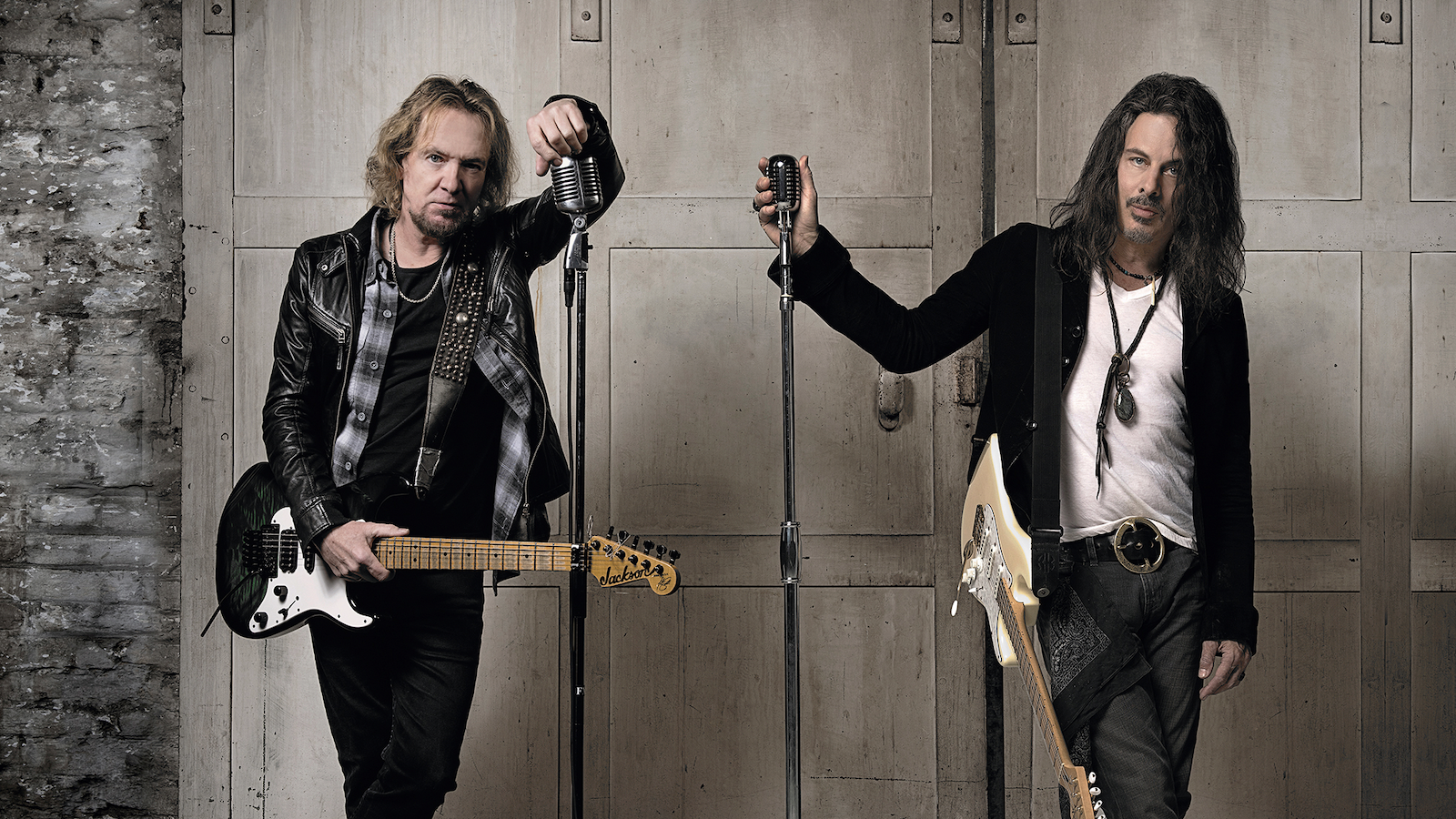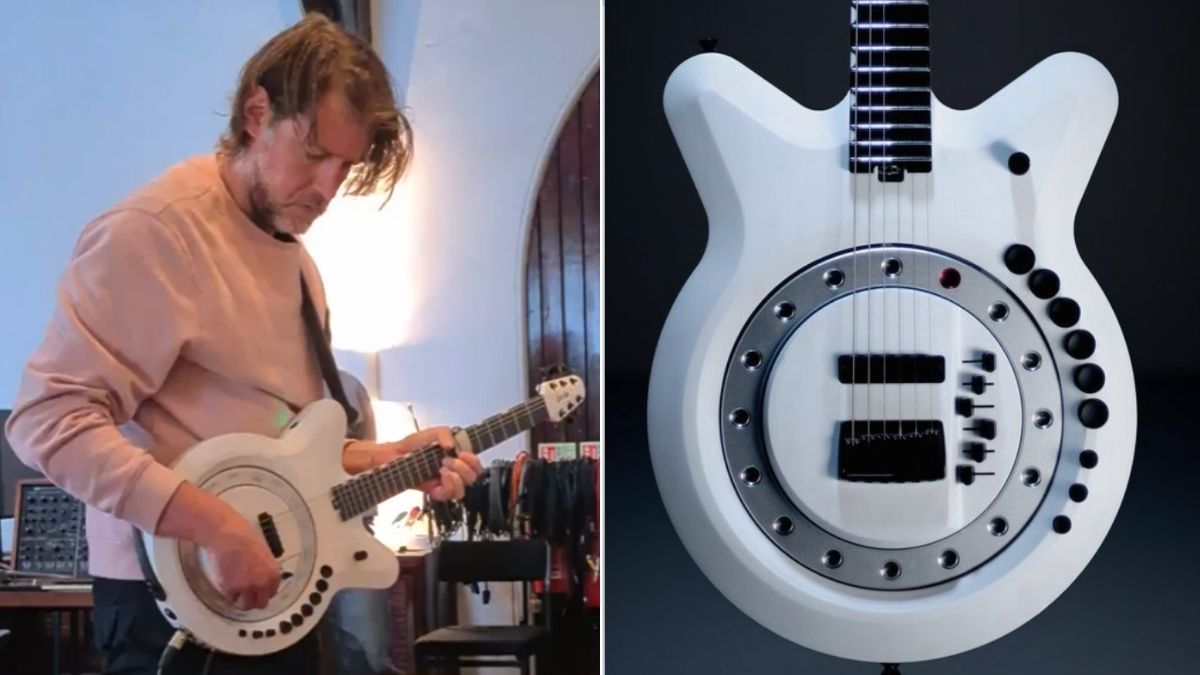Adrian Smith & Richie Kotzen: “The style of the record came from our instincts and how we play together”
What do you get when you put two of hard-rock’s biggest shredders in a room and tell them to get their blues on?

Note: this article is also featured in Australian Guitar #142, which is out now wherever great magazines are sold! Click here to read more about what’s in this jam-packed issue!
Especially true in the last two decades, hard‑rock supergroups and team-up albums come at a dime a dozen: it’s an easy way to sell one product to multiple fanbases, and brand value alone means quality can be an afterthought. We’re not saying it’s okay, but we get why so many veteran rock dogs – especially those whose primary outlets have either run their course or severely minimised their output – turn to these types of releases.
The upside is that when it’s easy to see behind the cheap gloss of most supergroups, it’s also easy to see when one comes about out the collaborators’ legitimate, genuine passion for their art. Such is certainly the case with Smith/Kotzen, the self‑titled debut effort from Iron Maiden’s inimitable lead shredder Adrian Smith and The Winery Dogs’ genre‑bending singer-strummer Richie Kotzen (who’s also played in Poison and Mr Big, amongst a slew of other projects and solo LPs).
Meddling well-seasoned blues and volcanic metal vibes, the record works for two equally compelling reasons: it combines each player’s individual strengths and creative idiosyncrasies, but it also takes them both out of their respective comfort zones, etching out otherwise unrealised potential – ideas that Smith wouldn’t have had without Kotzen, and vice versa. Considering both players have had their hands on fretboards for over 40 years, that alone is undoubtably impressive.
Before the record lands at the tail end of March, Australian Guitar got down to wire with both Smith and Kotzen.
Let’s start at square one: how did this collaboration come about?
Kotzen: I met Adrian a long time ago. Actually, to be honest, I met his wife Natalie first. She ended up introducing me to Adrian and we just hit it off right away; whenever he and Natalie would come out to Los Angeles, we’d all get together and catch up.
Adrian’s got a really nice room in his house out here where he’s got a few guitars, some amps and a console set up, so we’d lock ourselves in there and jam for hours. And we’d done this for years. Usually around Christmas, they’d throw a party and everybody would come around, and one year, I believe it was Natalie who said, “Hey, you guys seem to really play well together, why don’t you try to write something?” And the rest is history! I think the first song we actually worked on together became “Running”.
All the latest guitar news, interviews, lessons, reviews, deals and more, direct to your inbox!
So how did the project evolve from that first idea to what we hear now?
Kotzen: Well y’know, we kind of just went for it. I think the reason the record sounds the way it does is because of the influences we have – I grew up listening to a lot of classic R&B music, and Adrian loves the American blues, and we like a lot of the same bands – Bad Company, Free, The Who… A lot of those kinds of groups. And then when we got together, I think we really complement each other very nicely. I’ve got this history of doing everything on my own, singing and guitar playing, while Adrian is more accustomed to the two-guitar band setup.
So right out the gate, one thing I was really excited about was Adrian’s sensibility in the studio, between the production and his approach to the second guitar. Many times I’d do something and think, “Okay, we’re done,” and he’d be like, “No no no, I’ve got an idea!” And he’d come up with some cool countering guitar line – something I wouldn’t have thought of. So y’know, I think the style of the record came about the way it did because of our instincts and how we naturally play together.
Did you find that in working together, you were both encouraged to explore some different playing techniques, or try any new things out with the guitar?
Smith: It was certainly a little different to how it works in Maiden – Maiden is obviously quite metal and I’m quite ingrained in that way of playing, but I love bluesy rock as well. I always have – I grew up in the early ‘70s listening to bands like Free and Deep Purple, so that sort of bluesy rock is in my blood. I wanted to explore that a bit. I’d been playing more blues guitar in the last ten years or so anyway; I’ve gotten deep into it.
I always thought the blues would be pretty easy to play, but to actually nail the phrasing on a guitar – to get all the notes perfectly in the right place – is a real art. Take someone like Eric Clapton: although he’s not an Eddie Van Halen-type guitarist, he’s putting all the notes in all the right places, and every single note counts. So that’s what I wanted to try doing a bit more with this project. Richie’s got a lot of that spirit in his musicianship; when I discovered his music seven or eight years ago, I was surprised by how good a singer he was and how much soul he put into his playing.
How did you utilise effects to capture the energy you were looking for?
Smith: Well y’know, I didn’t have access to a lot of my equipment because we recorded abroad; most of my stuff was locked up in the warehouse with all the other Maiden gear. So I just had a Les Paul Standard and my green signature Jackson guitar, which I’ve been using on the latest Maiden stuff. And we used one amp, mainly, which was a Victory amp. It was very straightforward. We got a good sound and mic’d it up, and away we went. I didn’t have any of my effects with me either, so for any effects I wanted, I had to rummage through Richie’s collection – I’d pick out a chorus and a wah pedal, and that was about it. It was pretty stripped-down, really.
Richie, I have to ask about your stunning cherry red signature Telecaster – is that what you played on this record?
Kotzen: That, and the Telecaster version of the same guitar. However towards the end, there was a song or two where I had to do a solo and Adrian had his Jackson with the Floyd Rose tremolo set up, so I thought to myself, “Hm, let me try this.” It’s funny – a couple of the solos I did on Adrian’s guitar sound like the old Richie Kotzen, back when I was 18 and I had the Ibanez with the locking tremolo; I’d listen back and go, “Ah, that sounds like me when I was a kid!” So that was kind of fun – and that would have never happened had I not thought to grab Adrian’s guitar. Things like that made it such a fun collaboration. It’s nice to play with a guy that has good taste and a great facility, and that you can bounce ideas off. I’d never really had that type of a partner before.
Do you think a second record could be in the pipeline one day?
Kotzen: Sure! Why not? As long as we feel inspired and actually want to do it, let’s do it. But y’know, it’s funny because everyone else has asked that too – “Is there going to be another record? When’s the next one out?” We haven’t even released the first record yet! Let’s not get too ahead of ourselves! But if we’re just talking in the sense of what we’d like to do, then yeah, of course, I’d love to do more.

Ellie Robinson is an Australian writer, editor and dog enthusiast with a keen ear for pop-rock and a keen tongue for actual Pop Rocks. Her bylines include music rag staples like NME, BLUNT, Mixdown and, of course, Australian Guitar (where she also serves as Editor-at-Large), but also less expected fare like TV Soap and Snowboarding Australia. Her go-to guitar is a Fender Player Tele, which, controversially, she only picked up after she'd joined the team at Australian Guitar. Before then, Ellie was a keyboardist – thankfully, the AG crew helped her see the light…
